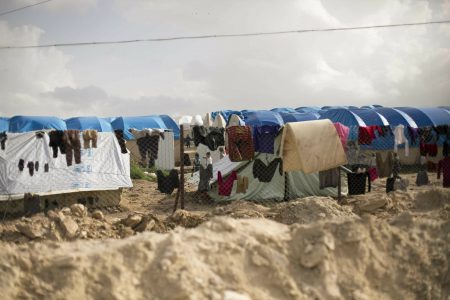
Canada working to bring citizens trapped in Syria home even Islamic State terrorists
Amid a deadly global pandemic, at least 47 Canadian men, women and children remain stranded in northeast Syria. While the Trudeau government has successfully facilitated the repatriations of nearly 40,000 Canadians from around the world in response to COVID-19, it has yet to bring home even one citizen from this group.
To be sure, these Canadians — eight men, 13 women and 26 children — won’t be easy to evacuate: they include Islamic State of Iraq and the Syria (ISIS) suspects and their relatives held in desert prisons and camps in a war-wracked region.
But their treatment should be of utmost concern to the Canadian government. They are detained by a Kurdish-led regional authority in appalling and often life-threatening conditions, with the tacit approval of the Global Coalition Against ISIS, whose members include Canada.
The Canadians are among thousands of suspected ISIS members and relatives rounded up by local, coalition-backed forces in northern Syria. Most have been detained since the March 2019 fall of the Syrian town of Baghouz, the last holdout of ISIS’s self-declared caliphate. Over the past several months, we have interviewed 11 family members of 19 Canadians detained in northeast Syria, four of the detainees, and dozens of aid workers and others who know about their plight. Human Rights Watch researchers, including one of the authors of this commentary, have also seen first-hand the deplorable conditions in the camps.
Authorities in northeast Syria have never charged these Canadians with any crime or taken them before a judge to review the legality and necessity of their detention, making their captivity both arbitrary and unlawful. Most, if not all of the children — more than half age six or younger, including a 5-year-old orphan — are innocent victims. And with little prospect of fair trials in northeast Syria, any adults who may be implicated in grave crimes are unlikely to be credibly held to account unless they face justice at home.
In makeshift prisons for the men and adolescent boys, food is scarce and overcrowding is so severe that detainees are forced to remain all day in nearly the same position. Scores of prisoners share a cell with a single latrine. In visits to the tent camps for women, girls and younger boys, we found that drinking water is often contaminated or in short supply, garbage and human waste litter the grounds, and illnesses including viral infections are rampant. Medical care in both prisons and camps is grossly inadequate.
COVID-19 can spread rapidly in such conditions, increasing the need for urgent action. Only six confirmed cases of COVID-19 had been reported in northeast Syria as of May 18 but with near-zero testing capacity in the region, the real number may be much higher. Due to aid restrictions, the region is woefully underprepared to deal with any significant outbreak.
Even before the pandemic, the embattled, Kurdish-led Autonomous Administration of Northeast Syria, which is detaining the Canadians, repeatedly called on countries to repatriate their nationals. The Canadians have been begging to come home, with many saying they are ready to face prosecution for any suspected ISIS crimes. Family members have also been beseeching Canadian consular officials to bring back their relatives or help them do so themselves. Four relatives even travelled to northeast Syria in failed quests to help their detained loved ones.
Prime Minister Justin Trudeau and his ministers have said they have not repatriated any of the Canadians because Canada has no consular presence in Syria and the region is too dangerous for officials to enter. Yet at least 20 countries, most without consulates in Syria, have found a way to repatriate some – and, in a few cases, hundreds – of their citizens from the camps and prisons. They include, since mid-October alone, Canadian allies Denmark, Finland, France, Germany, Norway, the United Kingdom and the United States.
Every government must grapple with the potential security risks and political fallout of bringing their nationals home. But these concerns do not absolve Canada of its duties to protect its citizens, which extend beyond its borders. Abandoning citizens to indefinite, unlawful detention in deeply degrading conditions also will not make Canada safer. Instead, it denies ISIS victims or their families their day in court, while creating grievances that could perpetuate cycles of violence.
If Canada can repatriate tens of thousands of citizens from 100 countries in response to COVID-19, surely it can devise a plan to return these few Canadians, too. Once home, they should be offered rehabilitation and reintegration services and, if appropriate, monitored or prosecuted.
Ignoring their plight while admirably pulling out all the stops to help evacuate thousands of other Canadians looks like discrimination — a violation of international law, the Canadian Charter of Rights and Freedoms, and the values that Canada holds dear. The lives of Canadians are on the line and the time for excuses is over.
Source: HRW





